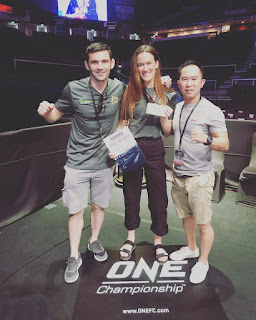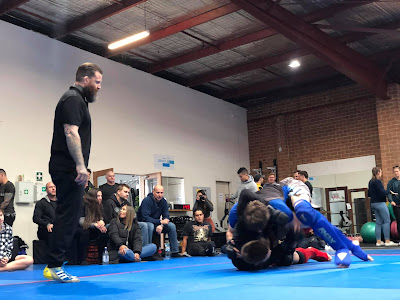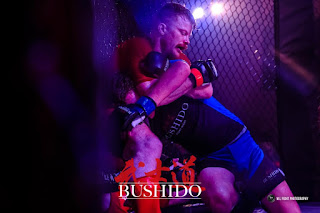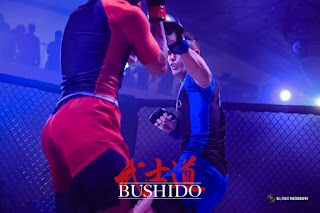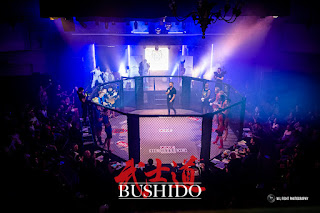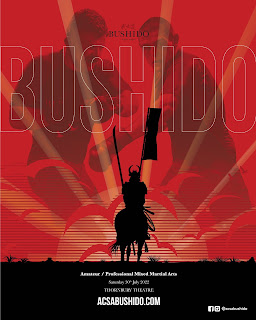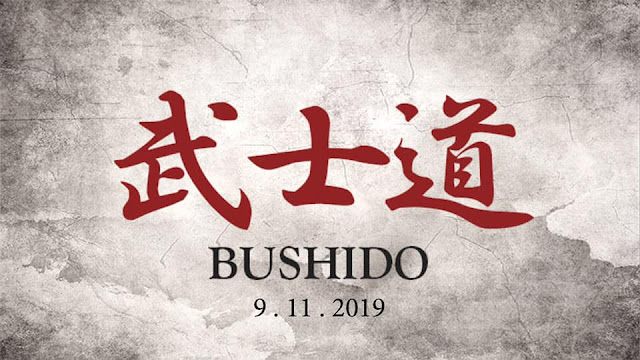Wednesday, 16 February 2022
Why we created Bushido Fight Night : Melbourne MMA
Sunday, 23 August 2020
The Problem with Amateur MMA
I've had a lot of involvement in Amateur MMA over the last twenty years first as a competitor and then as a coach. My first amateur fight was on my coach Fred Rados Pancrase event in London in September 2000. I competed in around 30 amateur matches in events such as Pancrase and KSBO before graduating to pro rules fights.
I competed in MMA to test myself and gauge my progress rather than seeing it as a career. Becoming a professional cage fighter wasn't a viable career option back in the early 2000s, MMA / NHB / Cage Fighting was a freak show sport back then and was still banned in most places.
Over the years MMA has become more and more mainstream. The sport of amateur MMA has also progressed a lot to the point where there are now large international amateur MMA competitions. I think this is great and I would always encourage my fighters to gain experience as an amateur if they are serious about having a successful fight career (I have previously made the point in this article - http://www.dkmmacoaching.com/2019/10/the-importance-of-amateur-mma.html?showComment=1598179230582#c7257568754422585315)
However, there are several problems that I see with the sport of amateur MMA which will need to be addressed for the sport to continue to grow:
Amateur MMA as a Pathway to Professional MMA:
The first problem is that it is obviously not really necessary to compete as an amateur to compete at the highest levels in MMA.
Every aspiring fighter wants to fight in the UFC, Bellator or One FC but Amateur MMA isn't always seen as a pathway to the highest level of competition.
It is unheard of in boxing for a fighter to turn pro unless they have had a long and successful amateur career. Almost every top professional Boxer in history was also an amateur champion before turning professional.
If we look at most of the champions or top ten fighters, they didn't compete in amateur tournaments - they came straight from the elite level of other combat sports - wrestling, kickboxing or Brazilian jiu-jitsu. Of the current UFC champions, there are very few that have had any amateur fights before starting their pro career.
Having a lengthy amateur career may lead to the fighter taking excessive unnecessary damage when it could be argued that you would be better just developing elite skills and competing in one of the three areas of wrestling, striking or BJJ and then transferring to MMA.
There are also arguably even easier entry pathways to make it to the big shows. These include building a 'padded record'. Fights against opponents who are picked specifically to lose so you can get into the big event with an undefeated record or having a flamboyant screen personality and getting there via a reality TV show.
Obviously, the problem with these last two options is that you will quickly get exposed once you actually fight at the higher levels but nonetheless they do seem like attractive alternatives for the up-and-coming fighter who is trying to fast-track his way to the top.
Not enough fighters to make Amateur MMA worthwhile
As mentioned above many fighters will just go straight to pro or will focus on competing in individual sports such as kickboxing and wrestling so that leaves a smaller talent pool of amateur MMA fighters. This, in turn, makes it difficult to hold worthwhile MMA tournaments or MMA circuits because the best fighters probably aren't competing so even if you win it might be meaningless in the long term.
Another problem is that with amateur MMA, there will never be enough fighters willing to step up and compete. At every 'MMA' Gym there will be members training and even competing in kickboxing or grappling but very few training in both & combining styles and even fewer willing to step up and compete, usually citing the reasons that they haven't been doing enough grappling recently because they've been focusing on their striking or vice versa. Of the few that do compete, they will usually only compete once or twice rather than committing to a longer-term amateur career.
One of the reasons for this may be that there just aren't enough regular amateur events to build up the necessary numbers of fighters. Most amateur fighters are lucky if they get the opportunity to fight three or four times per year compared to sports like amateur boxing where you could conceivably fight every weekend.
The problem of what is the difference between an amateur and a pro?
In most sports, the term 'Professional' usually has connotations of being a super-elite high-level athlete. This is usually the case in sports such as football or basketball but fighting is a different story. Anyone who has been involved for any length of time knows that being a ‘professional fighter’ is usually a meaningless term. Anyone can get a professional fighter's licence regardless of their skill or ability whereas not everyone can become a professional football player. The reason for this is that in combat sports the focus is less on skill level and more on selling tickets.
It is not uncommon to see amateur fighters who are light years ahead of some 'Professional' fighters in terms of skill and experience. This is something that would usually never happen in other sports and for that reason, it makes the entire concept of Amateur and Professional MMA somewhat meaningless.
I think a useful idea in the future would be that fighters aren't granted a professional fighters licence unless they have a minimum number of legitimate amateur matches with a specific winning ratio or have equivalent high-level experience in another combat sport.
Thursday, 28 November 2019
Advice for MMA Fighters - MMA Melbourne
As a coach, one of the worst things a fighter can do is to train hard in the lead up to a fight and then quit training straight afterwards. This is even worse when the fighters teammates also have upcoming fights to prepare for. It is very unlikely the coach will be prepared to put the same effort into training the fighter in the future if he knows they lack commitment. Another side of this is to not chop and change your training every couple of weeks, stick with what has been getting you results and gradually increase the volume and intensity of your training.
At the elite levels of any sport, every player is playing injured all the time. Get used to it, strap up your injured knee, elbow or foot and keep going. Select different exercises or techniques that won't exacerbate the injury but avoid taking time off at all costs. If training consistently to achieve your goals is important to you you will find a way to make it happen, if it's not important you will find an excuse.
The amount of extra training you'll get done by not working will usually end up not being worth it. Most gyms and martial arts schools do most of their training outside of work hours. Even if you quit your job in order to train full time most of your training partners will be at work.
Focusing on only one area at the expense of other skills will leave holes in your game which will be easily exploited by more experienced future opponents. Competing in other combat sports such as BJJ or amateur Kickboxing is a good safe way to gain valuable experience and develop your skills so that you are more well rounded and more of a threat when you fight in MMA.
Check out our MMA Classes at DKMMA Melbourne
Tuesday, 12 November 2019
Our first Amateur MMA Promotion - MMA Melbourne
We've been planning to run something like this for years and now finally felt the time was right. Over the years of training fighters we always felt that there were very limited opportunities for fighters to develop and get suitable competition experience in a way that prepared them for success in MMA.
The number one aim for our event was to provide a good avenue for fighters to gain competition experience in a way that would benefit them later in their fight career.
We were all very happy with how well the event ran and everyone who took part really enjoyed it and had great reviews,
Some of the things we focused on to make our event work well included.
A modified ruleset with No headshots. We were very clear about this in the lead-up and in the rules meeting before the matches. This rule-set is safer and means fighters can have several matches on one day. of course, it's going to feel different to fighting with headshots but the point is that fighters can gain valuable experience fighting under these modified rules that will serve them well when they do eventually progress onto fighting in pro-MMA rules,
We had several Fighters and Coaches say that they felt they would be at a disadvantage because they come from a kickboxing background and need to be able to strike to the head. In my opinion, the point isn't to win every match at this very early stage of your career. It is much more beneficial in the long term to gain valuable experience early in your competitive career and become a more well rounded and skilled fighter so that you don't get exposed later on in your career when the stakes are much higher.
I've always believed that the best career path for the long term athlete development of an MMA fighter is to compete in Grappling or BJJ tournaments as much as possible, compete in around 5 to 10 Amateur Boxing or kickboxing fights, compete in as many amateur (No headshot) MMA events as possible, then move on to Amateur MMA with head strikes and after 10 amateur MMA matches then you can fight under professional rules.
I believe this sort of long term plan is very important because too many fighters try to rush into pro rules MMA and then hope to learn on the job.
Finally, we spent a lot of time making sure the format for the day was well organised and scheduled so there wasn't too much waiting around and less confusion about what's happening when. This, in turn, leads to less nerves for the fighters and overall and more enjoyable.
Overall Bushido #1 was a great success and we are already looking forward to running the next event on Saturday 1st February 2020.
Thanks again to everyone who helped out as judges, referees and staff. Thanks to all the fighters and teams who came along to take part and thanks to all the spectators who came along to support, Hope to see you all at the next one.
Monday, 14 October 2019
The Importance of Amateur MMA - MMA Melbourne
The Importance of Amateur MMA - MMA Melbourne
One of the biggest problems I see with aspiring fighters is that they are in too much of a rush to fight Pro. If you intend to have a successful long term fight career it is essential to gain as much experience as possible as an amateur. Generally, you will only get one shot at a contract with a major promotion such as the UFC so it's important that you are close to being the finished product when you get there rather than hoping you'll improve once you get there.
Monday, 30 September 2019
My 5 Most Popular Blog Articles
Here are my 5 most popular articles since I began writing my MMA coaching blog in 2012.
Bushido Amateur MMA - MMA Melbourne
We are running our first ever amateur MMA event on Saturday 9th November. There will be no head strikes allowed (standing or on the ground) and will be round-robin format so everyone will get a few matches on the day.
This format will be a good first step for beginners who are looking to eventually compete in MMA but also just for martial artists of various backgrounds to try it out and test their skills under a compromised rule-set.
I believe that no head strikes is the best rule set for beginners to try out MMA. It's a great way for aspiring fighters to gain valuable match experience without the unnecessary risk of injury. I personally competed in many of thees types of matches in the UK in the early 2000s alongside future UFC stars such as Michael Bisping.
Here is the link to register:
https://www.eventbrite.com.au/e/bushido-amateur-mma-competition-tickets-72835722607
Kicks and Knee Strikes to the Legs
Punches to Body and Kicks to Legs are allowed when Opponent is in the downed position.
All throws and Takedowns
All Arm-locks and Shoulder Locks
Chokes and Strangles Excluding Neck Cranks
Leglocks Excluding Heel Hooks
No strikes of any kind permitted to the head.
No Slamming of opponent either as a result of a takedown or to escape a submission.
No Neck Cranks or Heel Hooks.
No Standing Submissions.
A fighter will receive Warning: Two warnings leads to Disqualification
No Grabbing Opponents clothing or Shin-guards, gloves or Knee-pads.
No running out of the competition area.
MMA Shin Guards
MMA Knee Pads
Mouth Guard
MMA or Muay Thai Shorts
One fighter has taken too many unanswered strikes from any position.
One fighter is in a locked-in submission but is refusing to tap and is risking injury.
Submission via Tap Out due to Strikes.
Technical Knockout due to strikes either in Standing or Grounded position.
Referee Stoppage
Judges Decision
Disqualification
Effective Striking - Strikes that have an immediate or cumulative impact with the potential to end the match.
Effective Grappling - Takedowns, submission attempts, reversals and the achievement of advantageous positions that have an immediate or cumulative impact to end the match.
A successful takedown is not just a changing of position, but an attack from the use of the takedown.
Submission attempts taking considerable effort to escape are given greater weight than those that are easily defended and escaped without effort.
Impactful throws and takedowns are weighted more heavily than athletes who are tripped or bundled to the mat.
Tuesday, 11 December 2018
My MMA Journey - Part 2
Tuesday, 4 December 2018
My MMA Journey - Part 1
Part 2 coming soon.
Sunday, 8 January 2012
Your first MMA fight
 |
Why do you want to fight?
You need to get the reasons straight in your head first. Make sure your reasons will be strong enough motivators to make you train hard and prepare well. You are not just representing yourself but also your team and your coach.
When are you ready to fight?
You are ready to fight when your coach tells you are ready. Your coach should have enough experience to know when his students are ready to compete (if he doesn’t then think about training elsewhere). Don’t ask your coach to get you a fight; it puts him in the awkward position of having to tell you that you aren’t good enough. Ask the other fighters at your gym how they started and what sort of volume of training they did before their first fight and then try to follow in their footsteps.
What experience to have first?
I’d recommend that most people train for about 6 months to 1 year before they have their first fight. This is the minimum time required to get comfortable with the fundamental skills (basic kicks, punches, takedowns & grappling) needed for MMA. Don’t try to fight without being good at the fundamentals of striking & Grappling. You wouldn’t take part in a triathlon if you could ride a bike and run but don’t know how to swim. It’s pointless, you need to be comfortable with all the skills first before you try to utilise them in a competitive environment.
Where to start?
I recommend starting off in either amateur MMA tournaments or in interclub sparring events. Amateur MMA is a good way to learn and test your skills without too much pressure or danger. The amateur rules that I fought under allowed grappling, striking and takedowns but with no strikes allowed too the head. Some have criticised these rules for being unrealistic however during my amateur competition days I saw many future UFC stars such as Dan Hardy & Michael Bisping also competing and they all went on to have successful fight careers.
How to prepare and what to expect from your first fight
The most important consideration is to make sure your fitness is up to scratch. There is absolutely no excuse for having poor cardio as it’s 100% within your control. This means lots of running, hill sprints, endless rounds of pad-work and grappling in the lead up to your first fight
After your first fight, what next?
The point of competing, especially in your first few fights is to treat it as a learning experience. After the fight you need to think about what you did right and wrong and what your strengths and weaknesses were. Whether you win or lose you need to analyse your performance and figure out what lessons you can learn to help your future training and performance. Also be realistic about the fight, maybe you won but the opponent was just very unprepared or made a silly mistake, that isn’t going to help to make you a better fighter. Maybe you fought really well and did everything right but your opponent was also really good and he just managed to get the win by decision. In this case you should be happy with your performance and just keep working hard and trying to improve so you can fight even better next time.
What other questions do have about how to prepare for your MMA debut? Please ask in the comments section below.
Here is another article on how to make the most of your Martial Arts Training:
http://deniskellymmacoaching.blogspot.com.au/2014/03/success-in-your-martial-arts-training.html
46 Rounds of Sparring for my 46th Birthday
To celebrate my 46th birthday, I rolled 46 rounds of Brazilian Jiu-Jitsu with my incredible students—all for a good cause! 💪🎉 Each studen...

Popular Posts
-
We have two great seminars coming up soon: On Thursday 7th February we have Alex Volkanovski and Frank Hickman for an MMA Wrestling Semi...
-
Why do some MMA fighters have successful careers while others start off well but then quickly go downhill? I’ve seen fighters have a lo...
-
Over the past two years, I've been working on specific grading criteria for each belt level in my BJJ classes. Previously we had always...






